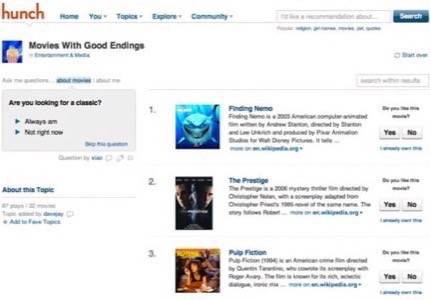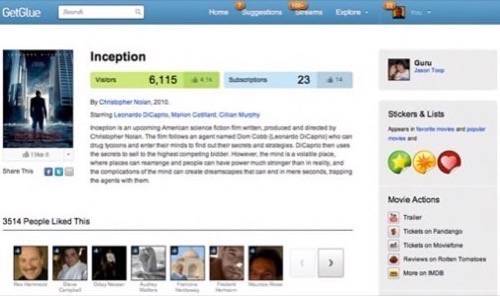A few weeks ago I wrote that we’ve moved to an era of the Web that is beyond social. My contention is that successful services of this era of the Web will be ones that filter, structure and personalize the vast amount of data coming onto the Web. An example of this kind of application is Hunch, which this week re-launched as an Internet personalization service. Hunch is one of a number of modern web services aiming to connect you not only to other people, but to products and objects.

Hunch co-founder and Chief Product Office Caterina Fake told Wired in a recent profile that “the ultimate goal of the company is to map every person on the Internet to every object on the Internet, be that a product, a service, or a person.”
I visited the Hunch web site today and answered more than 20 questions, in exchange for which I was offered a list of recommendations of magazines, books and TV shows. It’s not a perfect list – I doubt I’ll ever watch (connect to, follow) The West Wing, for example, no matter who or what recommends it to me. Nevertheless, Hunch is onto something.

Why Hunch Exists
The so-called Web 2.0 era of the Web was based on user-generated content and social networking around that. Services like YouTube, MySpace and Flickr (which was co-founded by Caterina Fake) were the success stories of that era.
But now, in 2010, there is too much user-generated content to manually process. What’s more, social networking is practically dominated by one company: Facebook. We no longer rely so much on niche sites like Flickr, YouTube, Netflix, Amazon to connect to other people socially. Another aspect to consider is that there’s a lot of new data streaming in from sensors, RFID tags and other Internet-connected objects.
The upshot is that we need web services that can help us process all of this data and connect us to the parts that are personally relevant to us.
Opportunities For Startups
The refreshing thing is that these trends are opening up huge opportunities for startups.
GetGlue is another example of a startup aiming to match social data to objects or media. It knows for example that I recently watched Inception and (mostly) liked it. GetGlue can use that piece of data about me, look at my history of other movie likes, connect that to the movie history and preferences that it knows about other people who liked Inception. Ultimately all of that social and ‘like’ data can be used by GetGlue to recommend other movies to me that I may like to see.

We’re early in this era, but both Hunch and GetGlue are busy building up extensive databases about people and what they like (their “taste” data). Not only that, they’re slowly perfecting recommendation engines that process this data – ultimately filtering, structuring and personalizing it.
Let us know what other ‘beyond social’ startups have caught your eye recently.

















